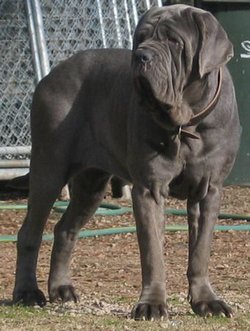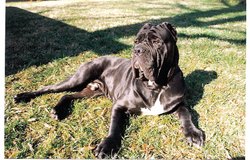
Mastino
Italian Mastiff
|
From Wikipedia the free encyclopedia, by MultiMedia |
| Neapolitan Mastiff | ||
|---|---|---|

Female Mastino
|
||
| Alternative names | ||
| Mastino Napoletano Mastino Italian Mastiff |
||
| Country of origin | ||
| Italy | ||
| Common nicknames | ||
| Neo | ||
| Classification and breed standards | ||
| FCI: | Group 2 Section 2 #197 | |
| AKC: | Working | |
| ANKC: | Group 6 (Utility) | |
| CKC: | Miscellaneous | |
| KC (UK): | Working | |
| NZKC: | Utility | |
| UKC: | Guardian | |
| Not recognized by any major kennel club | ||
| This breed of Dog is extinct | ||
| Notes | ||
The Neapolitan Mastiff is a large, ancient breed of Dog that can be traced back to about 100 BC. This Dog is a massive, awe-inspiring Dog breed often used as a guard and defender of owner and property.
Neapolitan Mastiffs are characterized by loose skin over their entire bodies; abundant, hanging wrinkles and folds on the head; and a voluminous dewlap. Coats can be blue, grey, black, brindle, or chocolate, sometimes with white on the chest or feet. Ears usually are half pricked and can be cropped. It has a large blocky head and a rolling gait.
The Neapolitan Mastiff is a fearless protector when it needs to be but is affectionate with its family and the family's friends; as a guarding breed it is quite wary around strangers but it will relax once it gets to know the person in question. It does not bark excessively and indeed only barks when something provokes it. As a breed the Neapolitan Mastiff can be stubborn, but it does not require repetitious training--once it understands what its master wants, it will obey. It has a dominant attitude and must be taught from puppyhood that its master is the boss, not the other way around. Males can be much more aggressive and dominant than females. A female works best in a home with a family, as she is a bit more docile and better with children. These Dogs are, however, usually very loving with children, provided they do not tease them. Males do not get along with other males, but the Neopolitan can get along well with non-canine pets if raised with them from puppyhood.
The Neapolitan Mastiff is not a breed for everyone and not a Dog for beginners. Children should be taught to respect these Dogs. Neapolitan Mastiffs should be well socialized at an early age to avoid over-protectiveness. They will be quite protective even with extensive socialization. Additional protection training is unnecessary because they are naturally guard Dogs and have been for ages. Obedience training is very important in this breed. The Neo is generally very tolerant of pain due to the breed's early fighting background. Males often drool quite heavily. They tend to drool more in hot weather or after drinking water.
The Neapolitan Mastiff is descendant of the Molossus, the mammoth war Dogs of the Middle East, and was frequently used in the Roman arenas pitted against lions, bears, and gladiators for entertainment. As Dogs of war, they fought alongside the Roman legions, and in this way they were spread throughout Europe. Eventually the descendants of the Roman Molossian splintered into several different Mastiff breeds: English Mastiff, Dogue de Bordeaux, Spanish Mastiff, St. Bernard, and Rottweiler.
In the 1940s, this breed was rediscovered near Naples in Italy, and is now beginning to make a comeback. A Neapolitan Mastiff was featured in the Harry Potter movies as Hagrid's Dog Fang.
 Male Neapolitan Mastiff
Male Neapolitan Mastiff
Dogs, made by MultiMedia | Free content and software
This guide is licensed under the GNU Free Documentation License. It uses material from the Wikipedia.